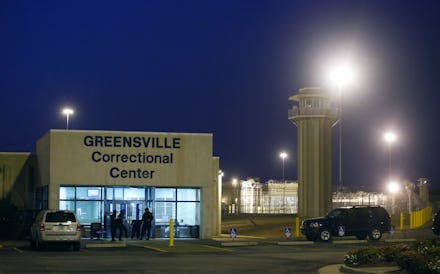Virginia Republicans Launch Lawsuit to Keep 200,000 People From Voting

Republican legislators in Virginia will file a lawsuit to prevent more than 200,000 people from voting in state and federal elections this November on the basis of their criminal convictions, the Associated Press reported Monday.
Just weeks ago, Democratic Gov. Terry McAuliffe signed an executive order restoring voting rights to more than 200,000 ex-felons in the state who have completed their prison sentences and paroles. According to the New York Times, the move was intended to remove Virginia from the company of Kentucky, Florida and Iowa, the other three states that permanently bar some convicted felons from voting for the rest of their lives. McAuliffe prepared the executive order quietly, and "few people outside his immediate staff knew of his plan," the Times reported.
Read more: Virginia Gov. Terry McAuliffe Restores Voting Rights to 200,000 Felons
Virginia's anti-felon voting law was introduced in 1902 alongside such other now-unconstitutional measures as a poll tax and literacy tests, the Washington Post reported. Laws preventing felons from voting disproportionately impact minorities — in Virginia, more than 20% of the black population could not legally vote, even though the state is just 13% black. The vast majority of the 200,000 ex-felons likely to actually vote are Democrats, thus making McAuliffe's decision an implicitly political one.
The order has infuriated the state's Republican Party, which passed a hotly debated voter ID law in 2013. In a statement provided to the AP, Senate Republican Leader Thomas Norment said "Gov. McAuliffe's flagrant disregard for the Constitution of Virginia and the rule of law must not go unchecked." The AP also reported the party has hired Charles J. Cooper, the lawyer who unsuccessfully defended California's same-sex marriage ban in 2013.
University of Virginia School of Law professor A. E. Dick Howard told the Times McAuliffe has "ample authority" to restore the felons' voting rights under his executive clemency power.
Nationally, millions lack the right to vote due to their criminal histories. In 2012, advocacy group The Sentencing Project estimated 5.85 million Americans would be prevented from voting in that year's presidential election, the Guardian reported. Their disenfranchisement has real consequences.
"First, studies suggest that rights restoration decreases recidivism rates, by allowing returning citizens to fully participate in society," Sean McElwee, a research analyst for think tank Demos, previously told Mic. "Second, because numerous studies show that turnout is correlated with government transfers and responsiveness, voting rights restoration would force politicians to respond to returning citizens. In the status quo, disenfranchisement encourages politicians to reduce spending on poor communities and communities of color."